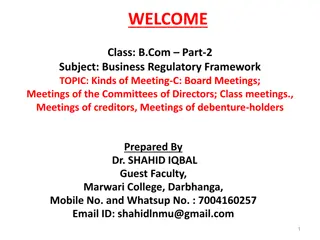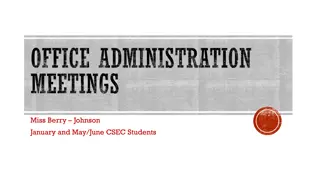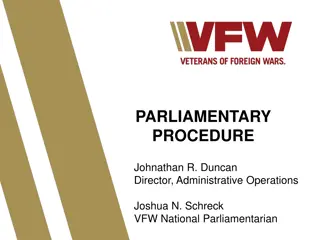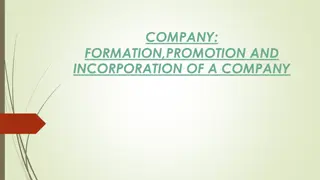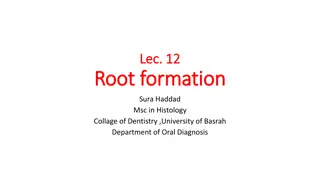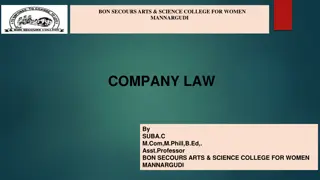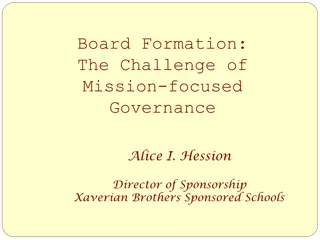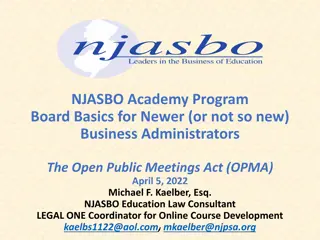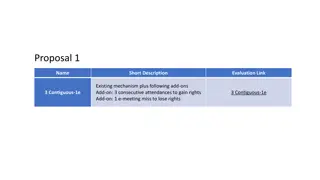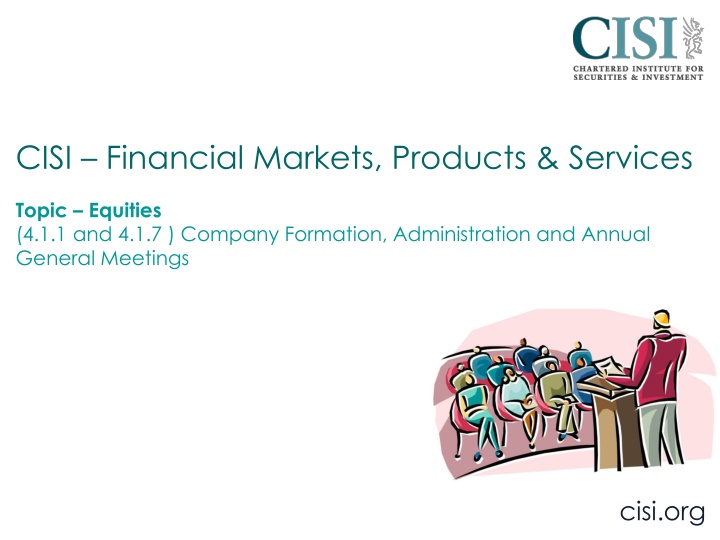
Company Formation and Governance Overview
Learn about the formation and governance of companies, including the benefits of setting up a company, types of company structures, and the significance of documents like Memorandum of Association and Articles of Association. Understand the requirements, roles, and responsibilities involved in establishing and running a limited company for successful business operations.
Download Presentation

Please find below an Image/Link to download the presentation.
The content on the website is provided AS IS for your information and personal use only. It may not be sold, licensed, or shared on other websites without obtaining consent from the author. If you encounter any issues during the download, it is possible that the publisher has removed the file from their server.
You are allowed to download the files provided on this website for personal or commercial use, subject to the condition that they are used lawfully. All files are the property of their respective owners.
The content on the website is provided AS IS for your information and personal use only. It may not be sold, licensed, or shared on other websites without obtaining consent from the author.
E N D
Presentation Transcript
CISI Financial Markets, Products & Services Topic Equities (4.1.1 and 4.1.7 ) Company Formation, Administration and Annual General Meetings cisi.org
Why set-up a company? Separate legal identity Limited Liability Company name protected Continuity Corporation tax lower than income tax New shareholders and investors easily introduced Supports growth cisi.org
Shares Governance Minimum of 1 Director Reporting Minimum of 1 shareholder Accounts must be filed with Companies House Cannot be issued to the public mainly family and friends Annual General Meetings not compulsory No independent audit unless annual turnover is more than 6.5m and assets worth more than 3.26m Private Limited Company (Ltd) Issued share capital can be less than 50,000 Company Secretary does not have to be a qualified person Shareholders and Directors are often the same people Memorandum of Association and Articles of Association required Accounts must be filed within 9 months of the year end 95% of UK Cos None are listed An incorporated business (Limited Liability) Abide by Companies Act 2006 Shares Governance Reporting Minimum of 2 shareholders Issued to the public Minimum of 2 Directors Accounts must be made public Must hold Annual General Meetings (AGM) Public Limited Company (plc) Accounts must be independently audited Minimum issued share capital is 50,000 Company Secretary must be a qualified person Majority of shareholders not Directors Accounts must be filed within 6 months of the year end 25% of shares issued must be paid up An incorporated business (Limited Liability) cisi.org Not all plcs are listed Abide by Companies Act 2006
Forming a Ltd Company To form a Limited company (Ltd), a particular set of documents need to be prepared, detailing specific information about the company: 1.Memorandum of Association 2.Articles of Association cisi.org
Forming a Ltd Company - Memorandum of Association Overall Purpose: Sets out the details of a company s existence It contains: Company s name Address of the registered office (must be England, Wales or Scotland for legal and tax purposes) Objects clause generally setting out what the purpose of the company will be. Statement of liability stating that shareholders have limited liability if the company is insolvent. Amount of share capital and how it is divided Issued share capital cisi.org Names of the subscribers
Forming a Ltd Company - Articles of Association Overall Purpose: Governs the running of the company. Acts as a contract between a company and its members (rights of shareholders). It contains: Details of how and when directors are appointed and the powers and operation of the Board of Directors. Details of how the share capital will be structured and divided into different types of shares which have different rights. It also states how dividends will be distributed amongst shareholders. Details of how shares can be transferred - directors of private companies usually want to restrict the transfer of shares to maintain control. Details of the rights of shareholders in terms of attendance and voting at company meetings cisi.org
Company Meetings Companies have meetings between the directors running the business and the Shareholders Plcs MUST holds annual general meetings (AGMs). This is typically the only time during the year when shareholders and executives interact. Public companies must hold an AGM within six months of the financial year end. At an AGM, shareholders are given the opportunity to attend, speak and Vote (a requirement of the Companies Act). cisi.org
Annual General Meetings What kind of items are discussed at an AGM? CEO and directors address the shareholders Presentation of the annual report company performance and strategy Resolutions are voted on, for example: Election or re-election of directors Appointment of auditors Payment of dividends Why are shareholders interested in these items? Profits and dividends may be affected by the decisions made at an AGM They may feel strongly about a particular resolution How do Shareholders get their point across about resolutions? By voting for or against resolutions put to them at the AGM Only those holding particular types of shares can vote Shareholders can appoint someone to vote on their behalf at an AGM this is known as proxy voting What do you think is meant by a special resolution? Ordinary resolutions are general matters put to shareholders e.g. Election of a director Requires a simple majority in favour of the resolution to pass it i.e. More than 50% of the vote Special resolutions are matters of major importance to the company e.g. Changing the company s constitution or dissolving the business Requires at least 75% of the vote in favour to pass it. cisi.org
General Meetings General Meetings are additional meetings between shareholders, executives and any other members. (Up until 2009 they were known as Extraordinary General Meetings or EGMS). They are usually called a short notice to deal with urgent matters. They are mainly used to remove directors. Examples: January 2015 Issues with the executives at Glasgow Rangers Football Club may see an EGM announced in an attempt by shareholders to remove the board of directors January 2015 Elliott Management Corp, a shareholder in Kabel Deutschland called for an EGM to discuss Vodafone's 2013 takeover of the German cable operator. It wanted to clarify whether the management and board failed in their duty when brokering the sale, and whether Kabel Deutschland was undervalued as a result. cisi.org




